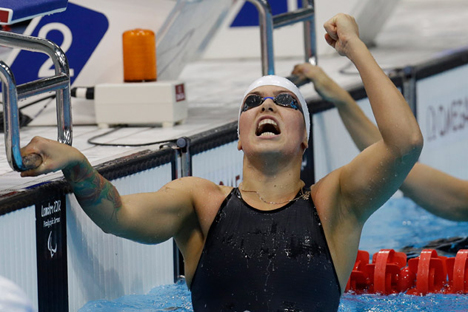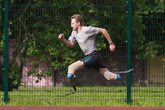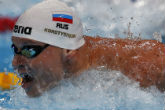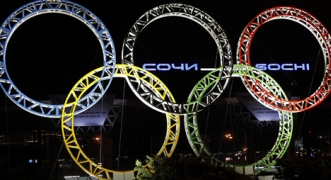Decorated swimmer raises awareness for Paralympics

Oxana Savchenko celebrates the 5th gold medal in the women's swimming at the 2012 Paralympics. Source: AP
Oksana Savchenko meets us at the entrance to the Burevestnik swimming pool in Ufa, wearing dark glasses and with her hair in a bun. A bright, striped jacket clings to the swimmer’s broad shoulders. Her movements and her gait are measured. She looks around but does not notice us right away. We shake hands. Oksana removes her glasses and smiles shyly. We follow the champion into the swimming hall where she trains.
In a small hall with gritty, pale green walls, a little girl is already warming-up. She can hardly tell the exercises apart, so her mother never leaves her side—another one of Igor Tveryakov’s pupils struggles with the challenges on the road to becoming an Olympian.
Her story
Oksana Savchenko was born on October 10, 1990, in Petropavlovsk-Kamchatka. She won her first big race when she was 13. Since then, Oksana has won more than 100 gold medals and more than 50 races in European and world individual championships. Savchenko won her first three Paralympic gold medals at Beijing in 2008. The Russian swimmer won five more in London and was ranked eighth among the Paralympic champions.
Igor Tveryakov is Oksana’s trainer.
“I noticed Oksana back in 2004, at the children’s championship in the Czech Republic,” Igor says.
“She was 13, but even back then I noticed in her a strong determination to win. Her parents were accommodating and we spoke; I told them immediately that she would be a champion. She grew up in Kamchatka, where her family lived in a hostel. She was just a babe in arms when she started to rub her eyes. Her doctor said it was conjunctivitis. She was crying, though, and couldn’t sleep at night. It turned out that, in fact, the optic nerve was already beginning to wither away. She underwent several operations over the course of a year and the process was stopped, [but] they could not save the sight in one of her eyes.”
Oksana’s awards are not counted in tens but in hundreds. She won more than 60 times at the Russian championships and more than 50 times at the European and world individual championships. By virtue of the last two Paralympic Games, she has returned to the status of the most decorated athlete on the Russian national team.
“Incidentally, I was star-struck after Beijing,” Oksana says openly. “It was the initial stage, which my friends and Igor Tveryakov nipped in the bud. I arrived at the first European championship after the Paralympics thinking I was a great champion and I was 100 percent sure of myself. I had won at the Games, I would win here. In the end, I lost all my races. It was then, at that same championship, that my trainer and I had a talk. He explained to me that I will experience both victory and defeat, and that you have to be unselfconscious about them and work harder. This was a psychological tonic for the rest of my life. Since that championship, I have never lost a race.”
In conversation with Oksana, you are subconsciously enthused with her energy. There is not the slightest trace of insincerity or bragging in her words. Oksana calmly remembers her childhood: “My mother tried to bring me up as a child without any physical difficulties. I had to match everyone and work twice as hard in my studies. My fellow pupils would tease me because of my cross-eyes. I grew up just like a normal person, and I was treated as an equal. I swam with the other guys; there was no Paralympic national team back then.”
“I was never angry with God about what happened to me. I am happy that at least I can see the world through one eye! I try to not think about what my life could have been like, if I had vision in both eyes. I am what I am. It is difficult for me to imagine what would have happened if I did not have sports in my life. When one of my friends starts to complain about their problems to me, which in fact are not that great, I just say to them: “Just take a look at the Paralympic Games!”
We sit at a light-blue plastic table next to a 25-meter long pool, which is half the size of the pools at all major global competitions. Oksana swims lengths at a moderate pace. Another swimmer is swimming in the same lane, and only when the pool empties do the Paralympians have the chance to train individually.
“These conditions are adequate to keep in shape, but we have to travel to the training camps to achieve really good results. There were seven ahead of the Olympics, and now there are only three to train for the world championship. All the money has now been re-assigned to winter sports, to prepare for the Games in Sochi. But we will win! A fat cat doesn’t always give its best, but one that runs around the streets hungry is more nimble,” says Tveryakov, smiling.
Tveryakov has his own story. His students often level accusations at the Paralympic athletes: They say that they were healthy and should not have taken part in the Paralympic Games. You can read an interview with those leveling these accusations in the local press.
“For us, an invalid is a person with no legs or no arms; but, in the international Olympic movement, people with impaired physical capabilities are divided into categories in which they do not need to compete with each other. Everything is checked thoroughly by special commissions; you can’t deceive them. They do not like it when we win, though. Right away I said to the guys: ‘You have won some glory, but now there will be a black mark against you.’ Everyone is more jealous of Oksana than anyone else, because she is the most successful,” Tveryakov says. There is indignation, shame and bitterness in the trainer’s voice.
“That was the worst year of my life. Arguments with my trainer, depression, past traumas resurfaced, new ones appeared, and I almost left sports completely, several times. Even now, I take my medals in my hands and I don’t understand how I achieved all this without going mad,” says Oksana, smiling.
Yet, remembering what she went through prior to the Olympics in 2012, her face is once again serious. “The day I competed in the 400 meters, my capillaries began to burst; but, even so, I went into that race with red eyes full of blood. The only thing that comes into your head is that we are not only swimming for yourself but to raise awareness of the Paralympic movement in Russia. The London Games were the first to really highlight the Paralympics, but, after Beijing, lots of people were asking me what the Paralympic Games were exactly.”
Oksana says that conversations about Paralympians being “charlatans” do not make her angry, but she is very offended by them. She recalls her first Paralympic championship in Russia, when the organizers did not even have the money to buy medals, let alone prize money. These financial difficulties, though, did not have any effect on the desire to win.
“We were happy if our travel to the competitions was paid,” says Savchenko. “But, now, they have started to give the winners money and apartments. Some of the guys become Paralympians just so that they can start earning money. Well let’s leave it at that; it’s a motivating factor all the same. That’s why people enter sports, to earn money! The main thing is that the attitude has started to change: We are at last starting to be considered athletes.”
The full article first published in Russian in Russky Reporter.
All rights reserved by Rossiyskaya Gazeta.
Subscribe
to our newsletter!
Get the week's best stories straight to your inbox


